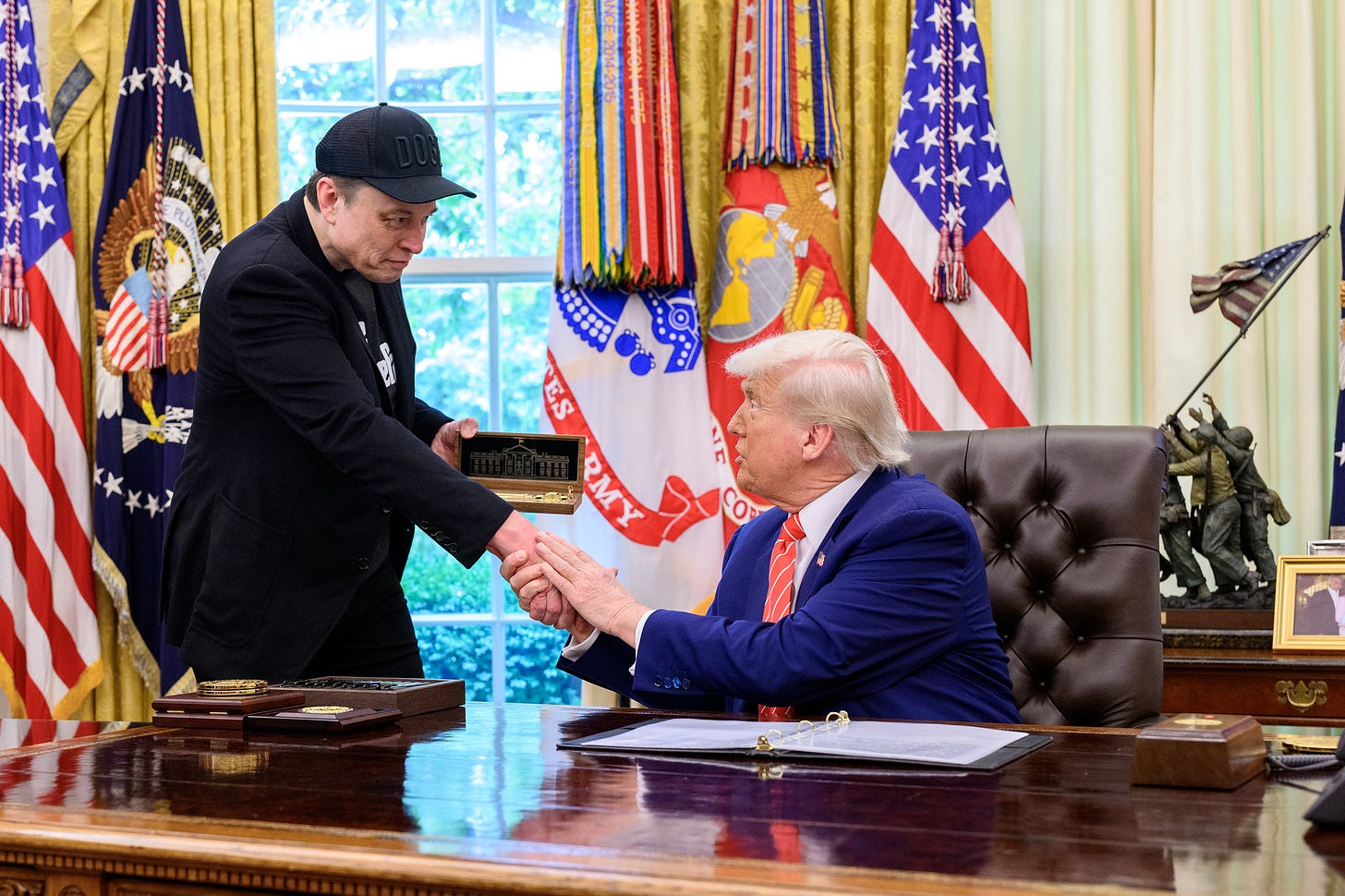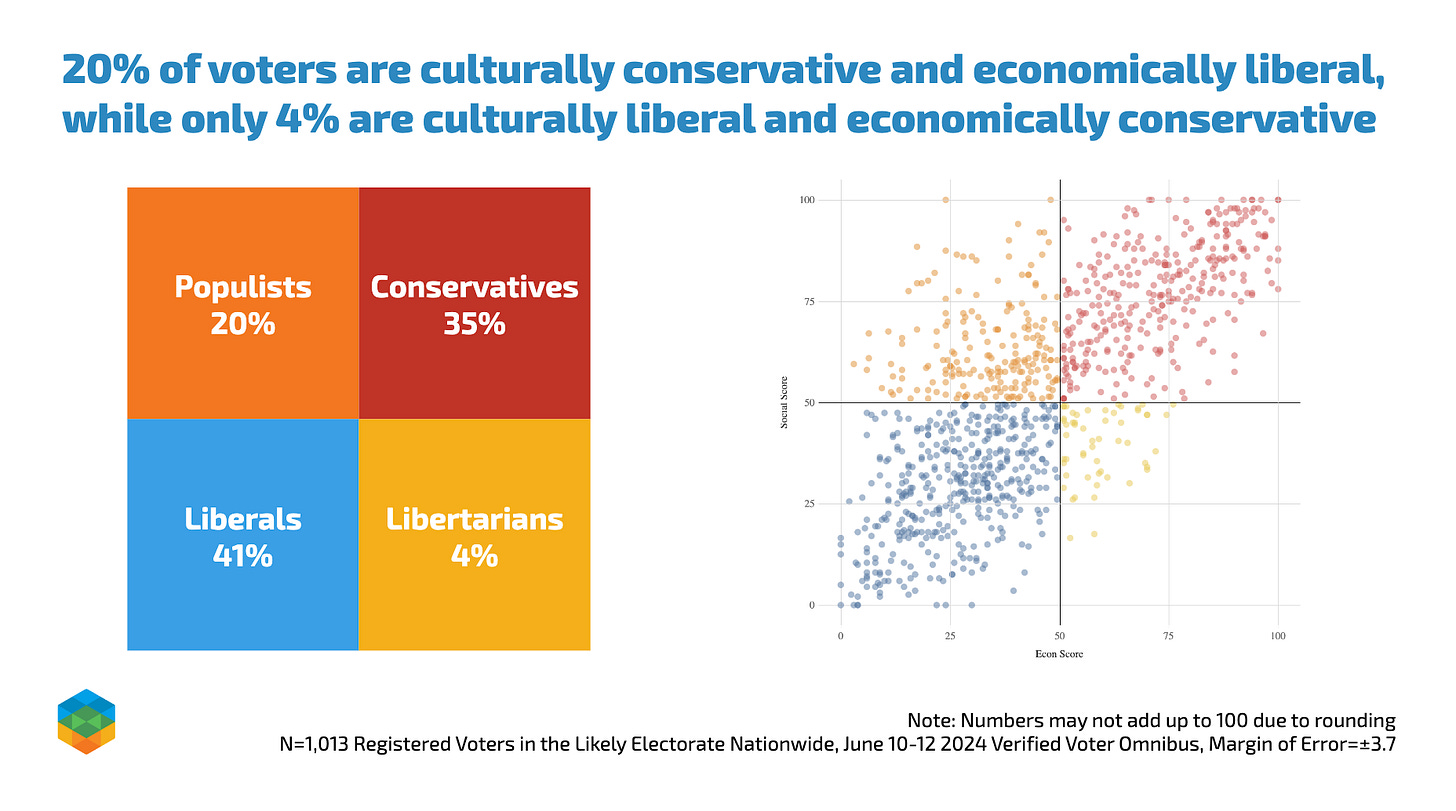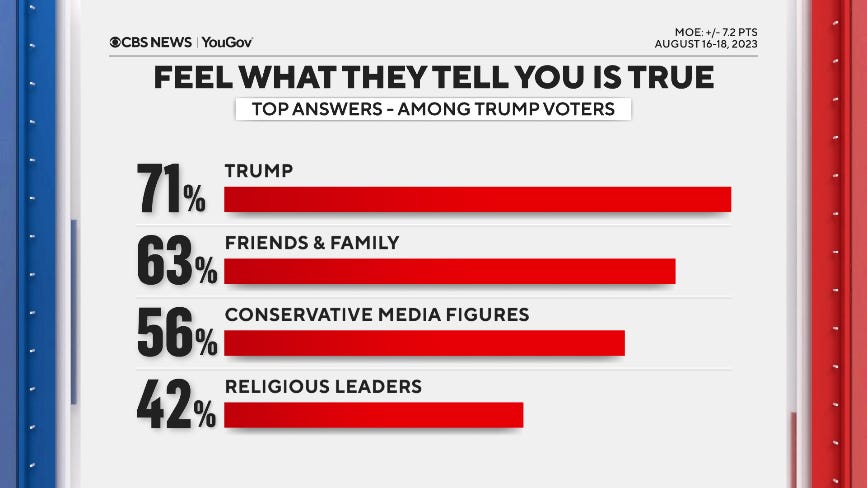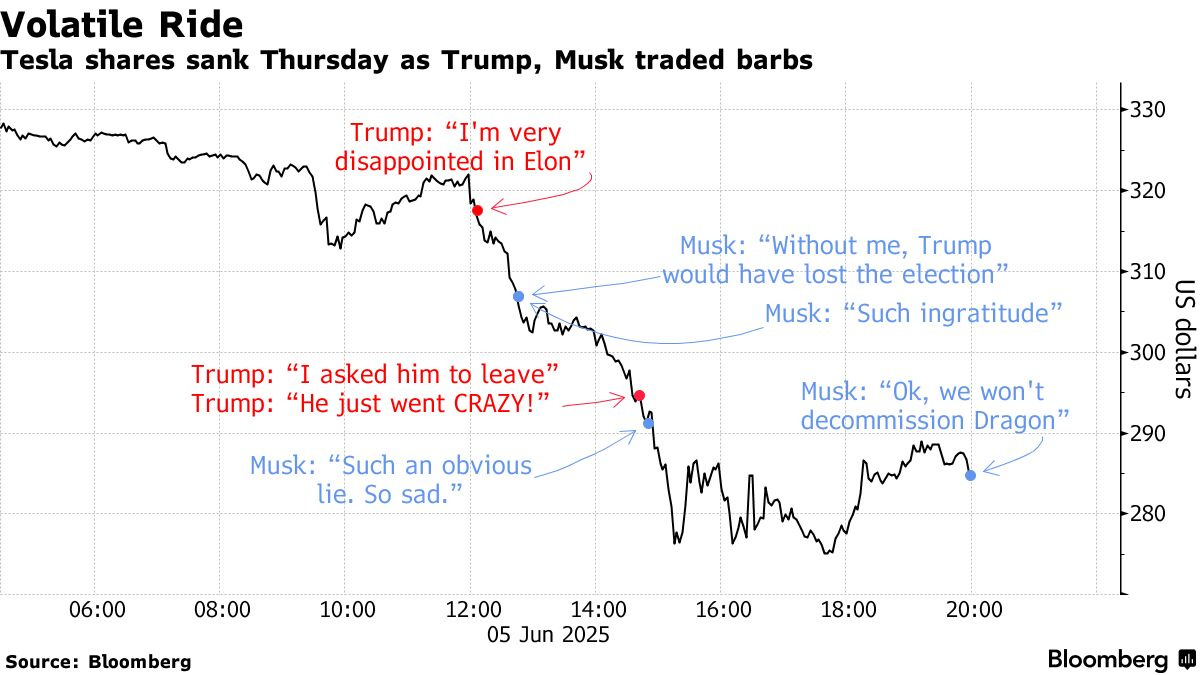Musk Won’t Beat Trump at His Own Game
The breakup everyone was waiting for.
One week ago today, Donald Trump and Elon Musk appeared together in the Oval Office as Musk prepared to leave the government. They laughed. They smiled. Trump handed Musk a ceremonial key to the White House.
“Elon’s service to America has been without comparison in modern history,” Trump said. “I expect to remain a friend and an adviser and certainly if there’s anything the president wants me to do, I’m at the president’s service,” Musk responded.
That was last week.
Yesterday, the relationship between the president and the world’s richest man — which defined the early stretch of Trump’s second term, but has been closely watched for cracks for months — imploded in a manner with few parallels in modern politics.
Tensions had already been forming behind the scenes: Trump was irritated that Musk almost received a top-secret China briefing at the Pentagon; Musk was unhappy that a close ally’s nomination to lead NASA was withdrawn. After exiting the White House, Musk began leading a drumbeat against Trump’s signature legislative package, the One Big Beautiful Act.
But it was on Thursday that their public rhetoric about each other went from 0 to 100, a complete reversal from their chummy joint appearance last week.
The morning started with Musk posting on social media, flagging a pair of posts Trump had sent during the Obama era about the national debt, suggesting that he was being hypocritical by championing the deficit-busting “beautiful bill.”
“I’m very disappointed in Elon. I’ve helped Elon a lot,” Trump responded in the afternoon, intimating to reporters that Musk was only criticizing the Republican megabill because it would end tax credits for electric vehicles, hurting Musk’s company Tesla.
Minutes later, Musk responded on X, which he also owns. “Whatever,” he wrote. “Keep the EV/solar incentive cuts in the bill, even though no oil & gas subsidies are touched (very unfair!!), but ditch the MOUNTAIN of DISGUSTING PORK in the bill.”
And, with that, the gloves were off. “Without me, Trump would have lost the election, Dems would control the House and the Republicans would be 51-49 in the Senate,” Musk wrote. “Such ingratitude.”
“Elon was ‘wearing thin,’ I asked him to leave, I took away his EV Mandate that forced everyone to buy Electric Cars that nobody else wanted (that he knew for months I was going to do!), and he just went CRAZY!” Trump responded on Truth Social, the social media platform he owns.
Over the course of the next three hours, Musk called for Trump to be impeached, predicted that his tariffs would cause a recession, and tied him to sex trafficking by suggesting that investigative documents related to the disgraced financier Jeffrey Epstein hadn’t been released because the president is mentioned in them.
Trump replied by threatening to terminate the government subsidies and contracts for Musk’s companies.
The most anticipated breakup in Washington had finally occurred. And, befitting its two participants, it took place in the most dramatic fashion possible, playing out for all to see on social media, which both men have long used as a refuge to stoke feuds and vent their feelings.
In retrospect, the Trump-Musk split was inevitable not just because they are both unwilling to share a spotlight, accustomed to hoovering up all the attention in their orbits. They are also two men who have strikingly similar styles of processing disagreements (even small ones), which is to say, both of them are famously unable to do so calmly.
And, as it turned out, there was a lot they disagreed on this whole time. And not just small things: they disagreed on two of the biggest initiatives — tariffs and the One Big Beautiful Bill — of Trump’s presidency, disputes that struck directly at the heart of Musk’s business interests and Trump’s political legacy. So this was never going to end well.
What happens now?
Musk is positioning himself as a rival for the MAGA throne, threatening to back challenges against any Republican lawmakers who support the megabill, musing about creating his own political party, and suggesting that he will outlast Trump as a political force.
“Some food for thought as they ponder this question,” Musk replied to a tweet asking which side of the feud Republican politicians would choose. “Trump has 3.5 years left as President, but I will be around for 40+ years…”
But the last decade of the Republican Party is littered with people who thought they were stronger than Donald Trump — and soon learned otherwise.
Of course, there are obvious examples like Liz Cheney, who was Wyoming political royalty until she voted to impeach Trump and then lost her next primary by 37 percentage points.
But I think it’s better to look at people who were Trump’s ideological allies, not just uneasy members of his coalition. Take Jeff Sessions, a longtime immigration hawk who was the first senator to endorse Trump’s first campaign. He was Trump before Trump. Sessions was sent to the Senate four times by Alabama voters, coasting to victory each time. And then he joined Trump’s Cabinet and got crosswise with the president by recusing himself from the Trump-Russia investigation. (Not even leading it, mind you, just removing himself from it.)
That was all it took: Trump breaking with him and then endorsing his opponent. The next time Sessions ran for his old Senate seat, in 2020, he was creamed in the GOP primary by 21 percentage points. Two decades of easily winning Republican primaries paled in comparison to one dispute with Donald Trump.
Or Steve Bannon, whose populist cred also predates Trump’s. It’s hard to remember now, but there was a brief period where Bannon left the first Trump White House and the two were sniping at each other. (“Sloppy Steve,” Trump called him.) Bannon started musing about running for president himself. “I have power,” he told Vanity Fair shortly after leaving the White House. “I can actually drive things in a certain direction.”
But he forgot that, in today’s Republican Party, his power — anyone’s power — is derivative of Donald Trump’s, not independent from it. It didn’t take long before Bannon was trying to work his way back into Trump’s orbit. Ron DeSantis, too, caught a whiff of MAGA fame and thought he could harness it against the movement’s leader. We all know how that turned out.
Each of these figures made the same mistake: thinking that their careers in Republican politics were strong enough to stand on their own, that they commanded enough support to survive outside Trump’s orbit. Instead, the minute they left the climate-controlled confines of Trumpworld, their sources of energy quickly shriveled up.
True, Musk comes to his Trump feud with an advantage that Sessions, and Bannon, and DeSantis lacked: namely, a $420 billion net worth. Which means, of course, his life will be fine (more than fine!) even if he and Trump never bury the hatchet.
But to the extent he wants to remain a force in politics, his spectacular wealth will only take him so far, because money can’t buy the most important thing he lacks: any hint of a political constituency to rival Trump’s.
Musk appears convinced that he boasts more support than Trump among the GOP: he shared a post that claimed (without evidence) that “the majority of republican *voters* strongly agree with Elon and want the BBB trimmed down,” referring to the “Big Beautiful Bill.”
A recent YouGov poll found that’s flatly false: 76% of Republicans support the package. (Do they know about the issues with the bill that Musk is raising? Maybe not. But all it takes to get a positive answer from many Republicans is to say something is “Trump’s proposal,” which says it all right there.) The same poll also found that Trump’s favorability among Republicans (87%) is higher than Musk’s (76%), and that there are few demographic groups among which the Tesla CEO is more popular than the president, giving Musk little room with which to build a rival coalition. Musk brought money to the MAGA movement, but unlike someone like Robert F. Kennedy Jr., he didn’t bring much of an identifiable political constituency, beyond maybe a few Silicon Valley or crypto types.
But Musk and his tech compatriots, wealthy as they may be, don’t quite have their finger on the pulse of the American public. In 2020, Musk told an interviewer that he’s “socially very liberal” and “economically right of center,” which tracks with his public statements over the last few days, supporting climate policy while also championing fiscal responsibility.
The Republican polling firm Echelon Insights has found that socially liberal, economically conservative voters are by far the smallest segment of the electorate, comprising just 4% of voters.1
So that leaves Musk — like other prominent anti-Trump Republicans — without much of a natural political home. If he wants to remain in politics, he’ll have to compete for influence among the same slice of voters that Trump commands.
The first test of that influence will be the fight for the Big Beautiful Bill, which Musk is frantically campaigning against. Musk is betting that Republican voters and lawmakers won’t support a bill simply because it’s fiscally irresponsible — but he seems to have missed the last several decades of American politics, when the U.S. ran up deficits under Reagan, Trump, and both Bushes even as they promised to balance the budget.2
DeSantis already tried to make a fiscal responsibility case to Republican voters in the 2024 primaries. Trump’s personal popularity won out then, and it will now, too.3
Back in December, Musk was able to rally his X followers to jam Republican phone lines, successfully killing a major piece of legislation. But that was when he was in Trump’s corner, and his main opponent was Speaker Mike Johnson (and Republican voters love hating on their House speakers.) Now that his fight is against Trump, it looks different: once again, he’s told his followers to call their congressmen. But this time, Republican offices say they’re hearing crickets.
The Big Beautiful Bill will undergo some changes in the next few weeks, but there are no signs Musk has imperiled it; no groundswell of lawmakers have followed his lead and come out against it, as they did in December. MAGA influencers and politicians from Charlie Kirk to Marjorie Taylor Greene have made clear their loyalties lie with Trump.4
“Nobody elected Elon Musk, and a whole lot of people don’t even like him, to be honest with you, even on both sides,” Rep. Jeff Van Drew (R-NJ) told Axios. “We’re getting people calling our offices 100% in support of President Trump,” Rep. Kevin Hern (R-OK) said. “Every tweet that goes out, people are more lockstep behind President Trump and [Musk is] losing favor.”
Even assuming that Republican voters are as animated by the deficit as Musk is hoping, first they would have to believe that the Big Beautiful Bill will increase the deficit to take his side. According to the YouGov poll, only 21% do. That’s not surprising when you consider that Trump is (falsely) insisting that it won’t, and 71% of Trump voters say they trust information coming from the president — more than the percentage that say they trust information from their friends, or family, or religious leaders.
Good luck competing with that.
At the end of the day, Trump simply has more leverage over Musk than Musk has over him — both politically and otherwise. The New York Times helpfully laid out four ways that each man could make life worse for the other. Musk, the Times wrote, could “wield his billions against Mr. Trump, his allies and his agenda,” which is true, of course, except for the fact that Trump never has to run for office again, so campaign donations don’t mean much to him.5
Other than that, Musk can “use social media as an irritant” (shrug), “drag Mr. Trump into controversy” (because Trump hates controversies?), and “use his companies to inconvenience the administration” (which we’ll return to).
Trump, on the other hand, could “cut contracts with Mr. Musk’s companies” (which are a significant amount of his business), “investigate Mr. Musk’s immigration status and drug use” (or his companies, which were facing several high-profile probes before Trump took office), “revoke Mr. Musk’s security clearance” (which could complicate SpaceX contracts), and generally “wield the power of the presidency against him.”
Doesn’t exactly sound like a fair fight.
And Tesla shareholders seem to agree. Here, per Bloomberg, is the company’s stock price throughout Thursday. Not hard to see who they think has the upper hand.
Maybe that’s why Musk already seems to be backing down: the one threat he’s made to “use his companies to inconvenience the administration” — by decommissioning SpaceX’s Dragon spacecraft, which NASA uses to take astronauts and supplies to the International Space Station — he already took back. According to Trump’s team, Musk is trying to schedule a call with the president to patch things up.
Trump dialed reporters at ABC, CBS, and CNN this morning to tell them he’s not interested. (“I won’t be speaking to him for a while, I guess, but I wish him well,” Trump said.) Per Fox, the president plans to either give away or sell the Tesla that’s been parked outside the White House since he publicly bought it from Musk in March.
I wouldn’t count out a rapprochement, though. Trump is generally more forgiving than you might think — though always on his terms, of course. Bannon is a great example of someone who Trump welcomed back after a time away (now, if you’re wondering, he’s calling on Trump to deport Musk). “I have never believed in having permanent enemies,” Trump said last month. He was talking about foreign affairs, but everyone from JD Vance to Marco Rubio could testify to the fact that that policy also holds up domestically.
If Musk wants to tend to his fortune and simply remain in the world of business, he might not need to grovel to Trump and try to mend fences (unless Trump starts targeting his companies, of course). But if Musk wants to remain a political force, that’s probably his only hope. A third party modeled off his ideology would command single-digit support, at best. He’s already burned all his bridges with Democrats in the last year.
And, in today’s Republican Party, you’re either with Donald Trump — or you’re irrelevant.
Adherents to this ideology are disproportionally found in the highest income brackets, which — per YouGov — is also one of the only demographic groups among which Musk’s favorability outpaces Trump’s.
In general, Musk seems to have gotten Trump’s campaign platform entirely backwards. He seems to have thought Trump’s promise about reducing the federal deficit was genuine, while his calls to impose tariffs and end the EV tax credits weren’t true priorities.
Any close observer could have told you it was the reverse, just as they could have told you that Trump feels loyalty to almost no one, something else Musk — based on his “ungrateful” tweet — seemed to be surprised by.
DeSantis, by the way, seems to be taking Musk’s side in the divorce. Recall also that Musk originally endorsed DeSantis last year, which was perhaps the first time that his Trump bromance wasn’t built to last.
That said, I could see Joe Rogan picking Musk’s side in the split, which would potentially be notable — or just prove that his political influence is smaller than it’s made out to be.
They still mean a lot to Republican lawmakers, who will doubtlessly miss out on Musk’s donations, but I’m not sure they have much to fear from him backing primary challenges against him. If Musk moves forward with backing challenges against every Republican who voted for the One Big Beautiful Bill, as he has threatened, that would require him challenging…all but two Republican House members. That’s how much of an island Musk is within the party on this.
And even if Musk were to bankroll challenges, recall Trump’s success rate when endorsing in Republican primaries last year: 96%.







This is on the much more interesting topic of WUTP's one-year anniversary. When I first came upon your newsletter through a good friend whose son knows you, I was ecstatic to see someone so young be so wise and balanced, and I have been reading you ever since. Great work. Now for some unsolicited wisdom harder earned: how to stay sane in an insane world when your job is to report on it. Take time off, regularly. You and your readers will be better off for it. The risk of burnout the longer you are in this job is huge, so pay attention to what you need to avoid becoming bitter and getting burned out. Keep alive the joy of knowing that you are making an important difference. Thanks for all of it. Now go have some fun.
"Each of these figures made the same mistake: thinking that their careers in Republican politics were strong enough to stand on their own, that they commanded enough support to survive outside Trump’s orbit. Instead, the minute they left the climate-controlled confines of Trumpworld, their sources of energy quickly shriveled up."
Well said Gabe. For Heavens sake. It doesn't take a rocket scientist to see this coming a mile away. Everything Trump touches and every person who buddies up with him ends up in ruins. Maybe he should give Giuliani a call? Compare notes? Musk should have seen this coming